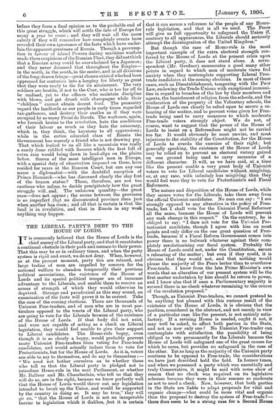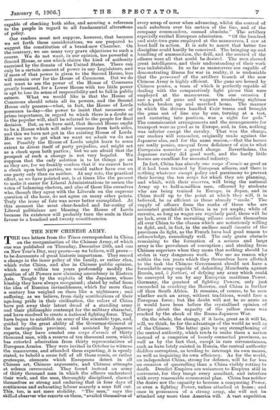THE LIBERAL PARTY'S DEBT TO THE HOUSE OF LORDS.
IT is commonly believed that the House of Lords is the chief enemy of the Liberal party, and that it constitutes a continual obstacle in their path and menace to their power. That this may be so in ordinary times, and when the party system is rigid and exact, we do not deny. When, however, as at the present moment, party ties are relaxed, and large bodies of men are impelled by concern for the national welfare to abandon temporarily their previous political associations, the existence of the House of Lords and its special political temper are of immense advantage to the Liberals, and enable' them to receive an access of strength of which they would otherwise be deprived. Strange and paradoxical as this may sound, an examination of the facts will prove it to be correct. Take the case of the coming elections. There are thousands of Unionist Free-traders, and of men who are in most par- ticulars opposed to the tenets of the Liberal party, who are going to vote for the Liberals because of the existence of the House of Lords. If that body did not exist, and were not capable of acting as a check on Liberal legislation, they would feel unable to give their support to Liberal candidates. The Home-rule bogey, even though it is so clearly a bogey, would probably prevent many Unionist Free-traders from voting for Free-trade candidates, and would actually induce them to vote for Protectionists, but for the House of Lords. As it is, voters are able to say to themselves, and do say to themselves :— "We need not bother ourselves as to whether those who tell us that the Liberal party is pledged not to introduce Home-rule in the next Parliament, or whether Mr. Balfour and Mr. Chamberlain, who tell us that they will do so, are in the right, because we know perfectly well that the House of Lords would throw out any legislation inteuded to break up the Union, and would be supported by the country in doing so. It may be true," they will go on, "that the House of Lords is not an insuperable barrier to legislation which it dislikes, but it is certain that it can secure a reference to-the people of any Homo, rule legislation, and that is all we need. The Peers will give us full opportunity to safeguard. the Union if, contrary to all appearances, the Liberals should seriously attempt the disintegration of the United Kingdom."
But though the case of Home-rule is the most important example of the extra electoral strength con- ferred by the House of Lords at the present crisis upon the Liberal party, it does not stand alone. A corre- spondent (Mr. Gardner) enumerates a good many other points in regard to which men of moderate views feel anxiety when they contemplate supporting Liberal Free- trade candidates at the coming elections. In most of these cases, such as Disestablishment, tampering with the Poor Law, endowing the Trade-Unions with exceptional immuni- ties in regard to breaches of the law by their members and agents, the banishment of religion from the schools, and the confiscation of the property of the Voluntary schools, the House of Lords can clearly be relied upon to secure a re- , hearing of the matter, and to prevent votes given for Free- trade being used to carry measures to which moderato Free-trade voters strongly object. We do not, of course, want to suggest that the power of the House of Lords to insist on a Referendum might not be carried too far. It would obviously be most unwise, and most injurious to the stability of the Constitution, for the House of Lords to overdo the exercise of their right; but generally speaking, the existence of the House of Lords may be relied on to prevent an electoral victory gained on one ground being used to carry measures of a different character. It will, as we have said,. at a time like the present enable a very great boy., o 141/4iouist voters to veto for Liberal candidates witlieut.,inisgiving, or, at any rate, with infinitely less misgiving; than they would feel were they to vote.for Protectionists and1 Fiscal Reformers.
The nature and disposition of the House of Lords, while they secure votes for the Liberals, take them away from the official Unionist candidates. No man can say : I am strongly opposed to any alteration in the policy of Free, trade, but I shall vote for the Unionist Fiscal Reformer all the same, because the House of Lords will prevent any rash change in this respect." On the contrary, he is obliged to say: "I dare not vote for the Unionist Pro- tectionist candidate, though I agree with him on most points and only differ on the one great question of Free- trade, because if a Fiscal Reform Government comes into power there is no bulwark whatever against their comr pletely revolutionising our fiscal system. Probably the House of Lords could not, under the Constitution, secure a rehearing of the matter ; but even if they could, it is obvious that they would not, and that nothing would please the majority of the Peers better than to overthrow Free-trade. I know from the late Prime Minister's own words that an alteration of our present system will be the first matter undertaken by him should he return to power, and I know also that if once a Parliamentary majority is secured there is ne-eheek whatever remaining to the course of the revolution proposed."
Though, as Unionist Free-traders, we cannot pretend to be anything but pleased with this curious result of the existence of the House of Lords, it is obvious that the position, considered in the abstract, and not merely in view of a particular case like the present, is not entirely satis- factory. If a revising House is needed, ought it not, it may well be asked, to affect both parties in the State, and not as now only one ? No Unionist Free-trader can contemplate with satisfaction the possibility of being obliged to vote permanently for the Liberals because the House of Lords will safeguard one of the great causes for which he cares, but provides no safeguard in the case of the other. Yet as long as the majority of the Unionist party continue to be opposed to Free-trade, the considerations we have just described hold the field. In former times, and when we possessed a party which was essentially and truly Conservative, it might be said with some show of reason that no check was required on its legislative schemes because they were in their essence so moderate as not to need a check. Now, however, that both parties in the State are liable to adopt proposals for vital and organic change—what could be more vital and organic than the proposal to destroy the system of Free-trade ?- there does seem to be a strong ease for a Second House capable of checking both sides, and securing a reference to the people in regard to all fundamental alterabions of policy. Our readers must not suppose, however, that because we set forth these considerations, we are prepared to suggest the constitution of a brand-new Chamber. On the contrary, we see many very grave objections to such a course. We do not want, in our opinion, too powerful a Second House, or one which claims the kind of authority exercised, by the Senate of the United States. There can only be a certain amount of power in any Legislature, and if more of that power is given to the Second House, less will remain over for the House of Commons. But we do not want to see the power of the House of Commons greatly lessened, for a Lower House with too little power is apt to lose its sense of responsibility and to fall in public esteem. What we would like is that the House of Commons should retain all its powers, and the Second House only possess—what, in fact, the House of Lords possesses to-day—the power to insist that measures of prime importance, in regard to which there is a doubt as to the popular will, shall be referred to the people for final decision. But, as we have said, that Second House ought to be a House which will refer measures from both sides, and this we have not got in the existing House of Lords. How we are to get what we want we admit we do not see. Possibly the House of Lords might learn to some extent to divest itself of party prejudice, and might act as a check upon both parties ; but we are afraid that the prospect of such a change is not very hopeful. We suppose that the only solution is to let things go on as they are, for we frankly confess that if we cannot have a check upon both parties, we would rather have one on one party only than on neither. At any rate, the practical effect, as we have pointed out, is at times like the present to make it easier for Liberal Administrations to secure the votes of balancing electors, and also of those like ourselves who, though they agree with the Liberals on the supreme question of the hour, do not agree on many other points. Truly the irony of fate was never better exemplified. At this moment the most clear-headed and far-seeing of Liberal politicians are blessing the House of Lords because its existence will probably turn the scale in their favour in a hundred and twenty constituencies.



















































 Previous page
Previous page